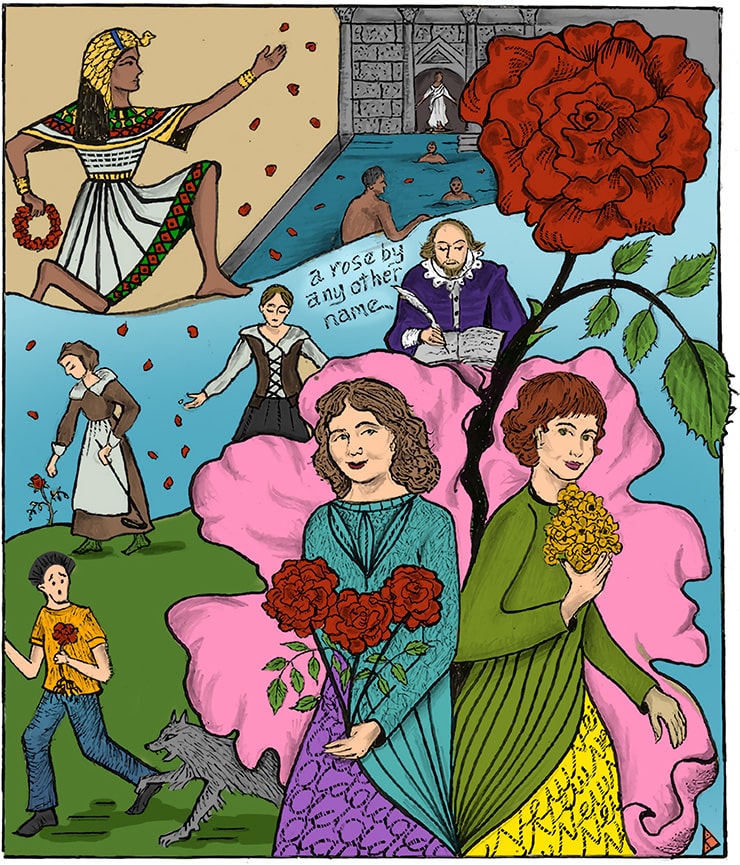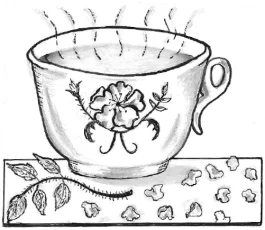Read by Matilda Longbottom

I am an unabashed romantic, heart and soul. I find romance in certain locations—England, Italy, and France come to mind—in historical legends, and especially in gardens. And there is one group of flowers that embodies everything a romantic flower should: history, beauty, stories and legends galore, even, in many instances, divine fragrance. I refer, of course, to the queen of flowers, the rose.
I recently had the opportunity to tour a true rosarian’s garden collection of over 140 roses. The owner whisked me around the two-acre property spouting Latin names, countries of origin, species, and growing requirements as if he were reciting complicated mathematical tables. I stopped taking notes shortly after he began: not only was my head spinning, but also my senses had wandered off into the realm of dreamy rose history and legend.
Join me, will you?
Roses figure prominently in history, art, literature, even medicine, and, of course, perfumes. Early American pioneers were devoted to their precious roses, so much that they carried them across the continent and sent letters home requesting cuttings.
Many of the old favorites flourished in an astounding way in the new land. A white rose planted in Arizona around 1885 made the Guinness Book of Records: by the late 1960s, it had spread over 8,000 square feet. Its trunk measured a whopping 95 inches in circumference!
Some rose varieties can trace their history back for longer than a few centuries. Archaeologists have reported finding withered rosebud wreaths laid onto tombs in ancient Egypt. Those desiccated blooms had been picked 4,000 years ago, but when they were put into warm water, the buds opened rose pink once more. I am entranced by this. That an ancient rose (probably the variety Rosa richardii, nicknamed the holy rose of Assyria) could resurrect itself for one brief moment thousands of years later is nothing short of miraculous.
I’m also fascinated by the evocative and often whimsical names of roses. I once bought a David Austin rose called Brother Cadfael solely because I was reading the series about the monk by Ellis Peters. Now I’m eyeing a rose called the Lady of Shalott. After all, I’m a fan of the poem by Tennyson. I also have the very old herbal rose called the Apothecary Rose because it was mentioned so often in literature.
Shakespeare, too, was smitten by roses. He often referred to them in his plays. Historians believe that he was referring to the Persian Musk rose when he penned, “A rose by any other name would smell as sweet.” However, I have it on good authority that this particular rose’s scent, far from being “sweet,” was actually more reminiscent of a stag in rut. That probably says something about the Elizabethans. On the other hand, the Romans mentioned the Autumn Damask rose as being “richly fragrant”—and in this case, they were absolutely correct. It has an almost overpowering true rose perfume.
In more recent times, battle has commenced between old rose enthusiasts (among whom I count myself) and those who only plant the modern hybrid tea roses. The modern lot say many old rose varieties bloom only once a year (though admittedly very abundantly) and can become quite large (such as the white rose mentioned earlier). The old rose lovers say that nothing beats the often intense fragrance of old roses and the stories and legends associated with them. I just love the fact that I can have an old rose in my garden that probably also bloomed in Josephine and Napoleon’s garden at Malmaison.
Speaking of stories, do these battles between rose lovers sometimes rival the historical War of the Roses between the forces of the White Rose of York and the Red Rose of Lancaster? Well, so far as I know, we have all stopped short of bloodshed. However, there actually have been instances of rose theft.

Yes, there are rose burglars. I’m not referring to the famous rose rustlers in Texas who have raided old abandoned cemeteries and farms to take cuttings of old roses in order to save them. (I believe the Yellow Rose of Texas in the song is one.) I refer instead to actual thieves who spot a rare rose growing in either public or private gardens and appropriate it for themselves. Some of this is all about the value of the rose and what it can be sold for on the (you guessed it) rose black market. Some rare rose collectors have gone to great lengths to protect their investments, including security fences, alarms, and large canines. They insure their prizes for vast sums of money. They have cameras trained on the rose, from inside the house. Still, the canny rose thieves sometimes successfully snatch a prize rose.
I would be remiss if I did not provide a few lines on the herbal and medicinal properties of the rose, as well as the use of the fragrance throughout history. The Elizabethans often mixed fragrant rose petals along with other pungent herbs such as rosemary and sage and strewed them about the floors of their homes. They did this for a very practical reason: the Elizabethans (even the wealthy ones and royalty) did not bathe very often. In fact, it was not at all unusual for them to be sewn into their underclothes for the entire winter season. Come spring, the entire family would peel off the now very rank underthings and then take a bath, often sharing the same bathwater. Hence, the need for some sweet-smelling herbs strewn on the floors.
The Romans, on the other hand, liked to bathe in vast marble-lined baths full of steam, fountains, and prancing statuary. One of the most famous (and still standing today) is in the aptly named city of Bath in England. They, too, used roses and rose essences lavishly, but mostly on their persons or strewn into their bathwater. They must have smelled nice, indeed.
Roses were used by apothecaries to make tinctures and medicines for all sorts of ancient complaints. They were also often made into teas to be drunk during the colder months to stave off the doldrums.
Which brings me back to the present. I personally enjoy blending dried rosebuds and petals into very black, loose English tea. It tastes surprisingly good, rather spicy and a bit sweet (without any sugar added). When a chill wind is blowing outside and all my garden is bleak, I can still lift a steaming cup and smell my summer roses again. Ahhhh. I inhale the essence, and the romance, of the rose. ❖


 Previous
Previous

